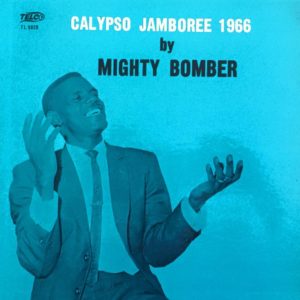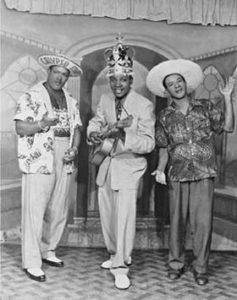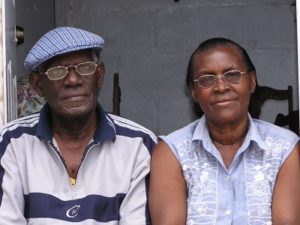|
Getting your Trinity Audio player ready...
|
Reading Time 5 mins
February 8, 2022
Insofar as a philosopher questions our everyday assumptions about life,
Bomber was a philosopher … He was pure calypso, in the vintage sense that Pretender was.
He won the Trinidad and Tobago Calypso Monarch in 1964 with the most incontrovertible double entendre composition. His smooth, melodic delivery glossed over the covert/overt sexuality of the story and enchanted us in a lyrically poetic gem of storytelling. “James and Joan” was a composition of marvelous, metaphoric manipulation, a gem of lyrical navigation. It was a composition extraordinaire. Like the Mighty Sparrow (Slinger Francisco), the Bomber came to Trinidad from his Grenadian abode as a 19-year-old. He settled first with Small Island Pride, a fellow calypsonian, then with family in the hills of Laventille. The Bomber was a long way from his difficult days in Grenada. He sang calypsos from the tender age of 11 and had the master of ceremonies declare him the local competition winner on seven consecutive occasions. On the first occasion, an audience member proclaimed that he had dropped a bomb. From that declaration, the sobriquet “Bomber” emerged. He had bombed himself into calypso immortality!
He dropped more bombs during his more than sixty years in the world of calypso, his only fraternity. Not only did he compose gut-wrenching humorous calypsos for his rendition, but he also generously gave his gift of authorship to others. “Portrait of Trinidad” (disputably a Bomber composition) sung by the Mighty Sniper made such an impact on our national consciousness many were of the view that the Government should have made it a national song. Instead, he delighted us with heavy humor on topics like his “Grandmother’s Advice” or simply bringing back to life Spoiler’s sense of the absurdly rebellious and ridiculous imagination, “Fountain of Youth” being the prime example. Interestingly, when the prolific master calypso composer, the late Dr. Winsford “Joker” Devine, published his comprehensive list of calypsos he had written for others, some unexpected names appeared on that list. Such revelation gave the lie to public claims made by well-known calypsonians about their professed prowess in the art form. Bomber did not appear on that list, having his list of calypsonians who benefitted from his writing.
But there was more to Bomber than that eclectic humor and political commentary and the more than 300 or more calypsos-CLR James called them academic papers/theses-he wrote in his career. He dressed immaculately. As was the custom of the day, calypsonians dazzled with their tailored outfits. The Mighty Duke, as an example, would grace the stage with long flowing multi-colored overcoats resplendent in the glow of stage light. Bomber was less extravagant, but, according to Sprangalang (Denis Hall), the Mighty Bomber, like most mindful calypsonians of old, was a man of sartorial elegance, impeccably suited for the occasion, whatever the occasion. Such aplomb was a long way from his delinquent days in Grenada when he carefully attended to his wardrobe of one shirt and a single pair of trousers. Though poor as the proverbial church mouse, he never became enchanted with material wealth, losing his parents early. Instead, he chose to develop faith in God and give his time to the church, as he did lovingly in his final years.
 Bomber never used the stage as a dancing platform. In that sense only, Bomber became a master performer simply by employing a limited number of dance moves to emphasize his remarkably compelling lines of lyrical genius. When he sang some of Spoiler’s compositions, he further elevated humor to a kind of visual art, where perfectly matching outfits perfectly fitted the careful choice of chorus harmonizing laughter like serious business. He rendered, for example, the best among them about some people in a village who lost their memories and were engaging in actions that made thoughtful people stop and go, “huh?”
Bomber never used the stage as a dancing platform. In that sense only, Bomber became a master performer simply by employing a limited number of dance moves to emphasize his remarkably compelling lines of lyrical genius. When he sang some of Spoiler’s compositions, he further elevated humor to a kind of visual art, where perfectly matching outfits perfectly fitted the careful choice of chorus harmonizing laughter like serious business. He rendered, for example, the best among them about some people in a village who lost their memories and were engaging in actions that made thoughtful people stop and go, “huh?”
Dementia has become a pandemic disease among a much older demographic and increasingly worrisome among a significant number of younger people. He crooned, “My memory tells me I’m okay. But who can trust memory at this late stage?” Like Spoiler, he was always capable of injecting humor into weighty topics. Indeed, he did incomparable renditions of Spoiler classics and hit the mark with his early identification of an illness that has become notorious for destroying personality and requiring family support in difficult times. The involuntary and inevitable degeneration of the human neurological system is good evidence of how little control we have over our various physiological functions. Bomber used Spoiler to remind us of that human fragility, as he kept close to his faith to remind himself of the Christian sin of separation.
As with many historical events and personalities, we wait too long to discern and recognize the value of their contribution. Some of these strong poets were men before their time. Bomber would refute any such claim, sticking instead to the deceptively simple notion of what a calypsonian was. Insofar as a philosopher questions our everyday assumptions about life, Bomber was a philosopher. He was no crossover artist, singing chutney or soca or sometimes a ballad here and there. He was pure calypso, in the vintage sense that Pretender was. No one would mistake Kitchener for a soca artiste or a likely chutney contender. Cypher, Terror, Duke, Spoiler – these were “true, true” calypsonians. Ditto for the Mighty Bomber. He is a legend.
From lovely and softly lascivious stories like “James and Joan” to justifiable claims in “The Godfather of Calypso,” Bomber was indeed a godfather of calypso. Calypso was his child, and he held its hands, loved it, nurtured, and prepared it for its vital contribution to the stories our culture tells the world. His list of compositions includes some unforgettable songs: Sexual Harassment, The National Song, Portrait of Trinidad, Peace in the World, and Bomber’s Dream, among several others.
The genius of “James and Joan” was later captured by the American philosopher Richard Rorty, who persuades us that all life is contingent, unpredictable. Like the psychologist Sigmund Freud, Rorty saw luck as worthy of determining fate. Listen to Bomber’s rendition of his monarch-winning song of delightful storytelling. And one can trace the evolution of love from naive playfulness to the profound responsibility of the family. With five little children in Laventille (“For Joan is my wife and James is me,”) one can easily extrapolate the story to an understanding not only of social evolution but of evolution itself. Slow and incomprehensible, forever lending itself to an excellent conceptual plot that may have some correspondence to the reality in which life is taking place.
In the end, even his musical renditions proved inadequate to the task of slowing his slide into osteogenesis imperfecta, a disease in which bones degenerate into a dangerous brittleness, rendering treacherous any accidental fall or involuntary slip. He broke bones but never his spirit. He remained firm in his belief in God, trusting in the Lord, and leaning on the evidence of trees and seas and wind and stars as all he needed to reaffirm his Christian faith continuously. And performer par excellence that he was, he could find no way to bomb himself out of this final call by the master of all ceremonies.
 Dr. David Brizan, a graduate of the Royal Military Academy, Sandhurst, is a Leadership and Life Empowerment Coach, working at the intersection of creativity and pragmatic action. He is the inventor of the VICAR model of constructive living and C2nd Linguistic Strategies. His work delivers unconditional personal power (UPP) with models, tools, and empowerment techniques through Responsible and Rugged Individualism (2RI). He provides transformational coaching, training, and workshops throughout the Caribbean and North America.
Dr. David Brizan, a graduate of the Royal Military Academy, Sandhurst, is a Leadership and Life Empowerment Coach, working at the intersection of creativity and pragmatic action. He is the inventor of the VICAR model of constructive living and C2nd Linguistic Strategies. His work delivers unconditional personal power (UPP) with models, tools, and empowerment techniques through Responsible and Rugged Individualism (2RI). He provides transformational coaching, training, and workshops throughout the Caribbean and North America.


